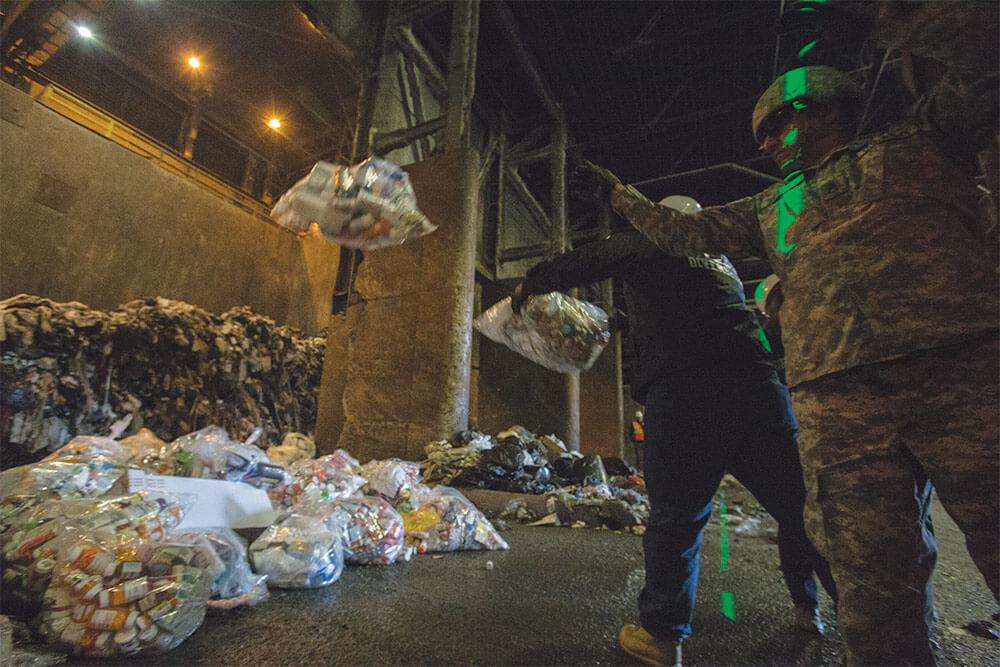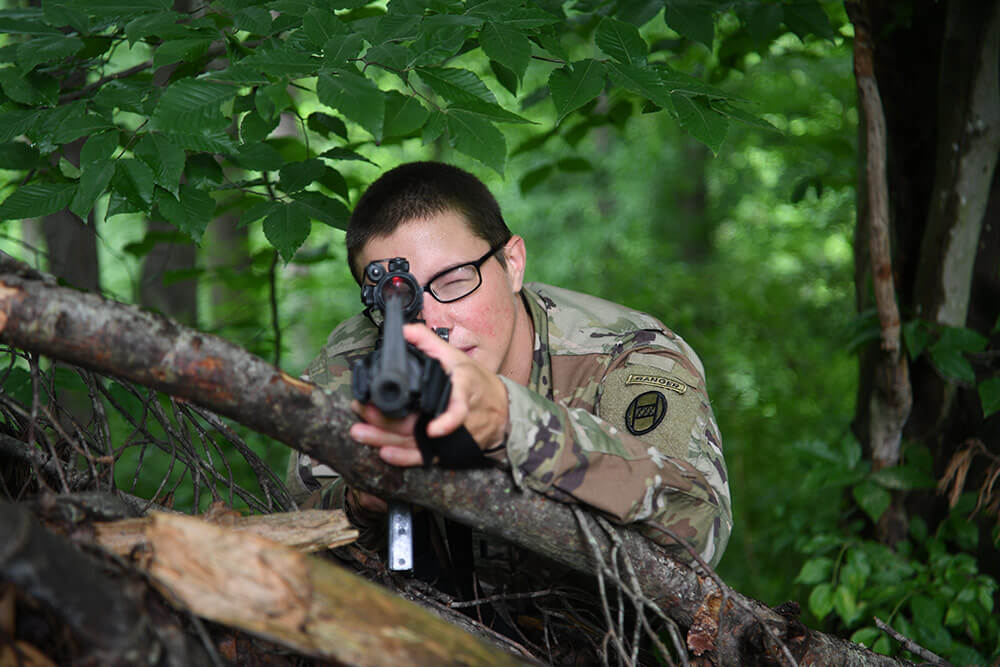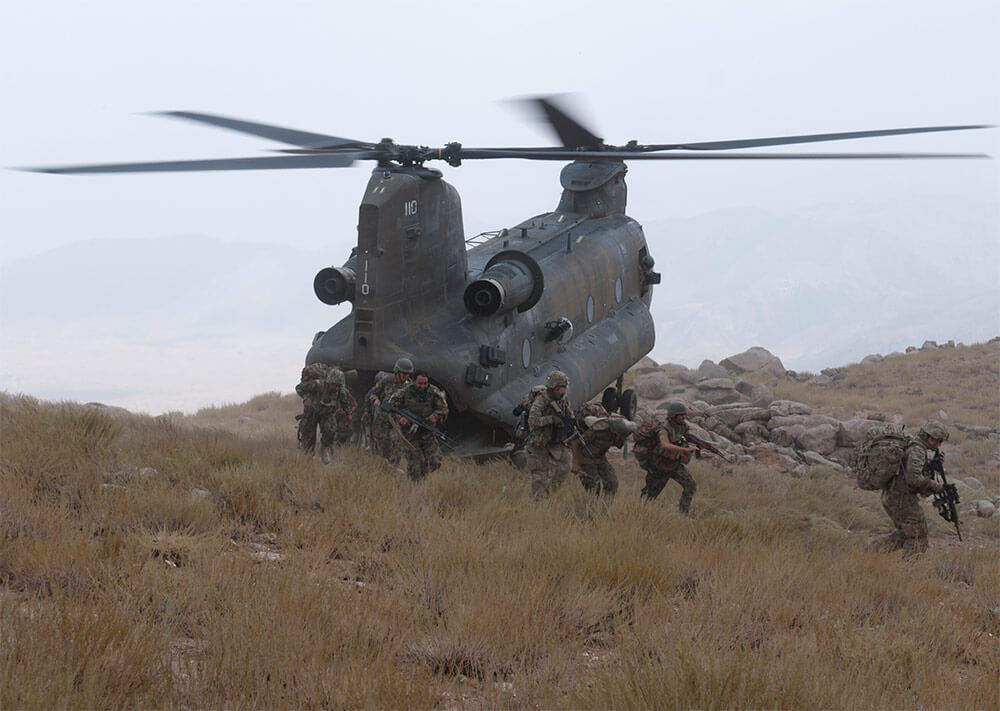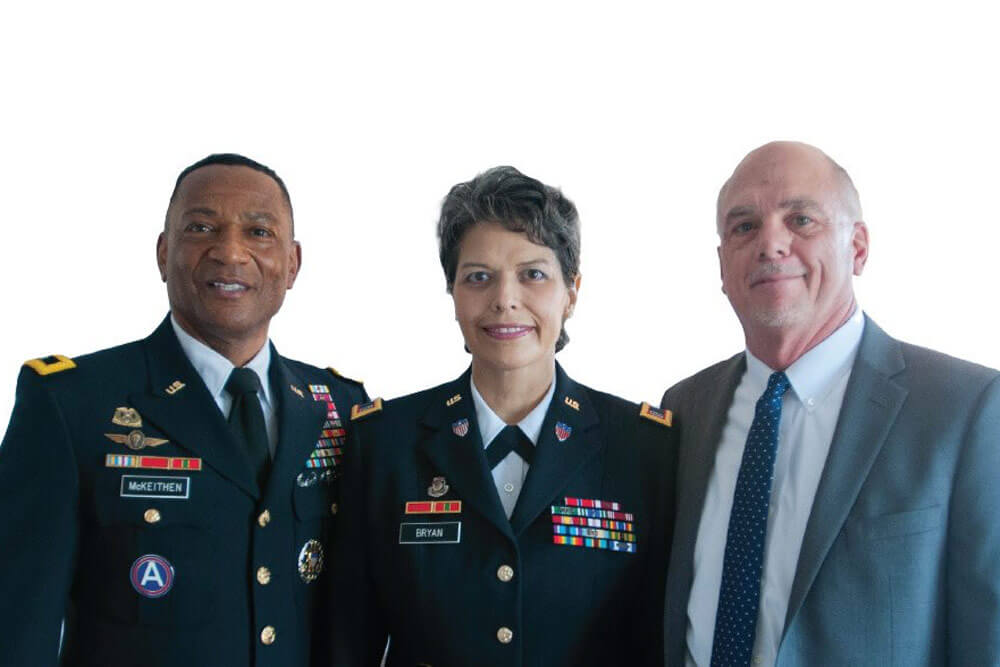The New Jersey Army National Guard Lands a Punch in the Nation’s Fight Against the Opioid Epidemic
“The opioid epidemic that is occurring in our back yard is not a problem that can be addressed by a single agency – it will take cooperation throughout all levels of law enforcement.” This was the concern expressed by New Jersey Congressman Chris Smith in response to his State’s snowballing drug epidemic.
Natural disasters and homegrown terrorism are not the only domestic threats facing the United States today. An insidious epidemic is taking the lives of tens of thousands of Americans each year, and has the potential to kill thousands more.
In 2016, more Americans died from opioid overdoses (64,070) than those that died in the Vietnam War (58,200), according to a report from the Police Executive Research Forum, an independent research organization that focuses on critical issues in the policing community. That death toll is more than double the number of overdose-related deaths from just 10 years ago.
The Department of Health and Human Services describes opioids as natural or synthetic chemicals that bind to receptors in the brain or body. Common opioids include heroin and prescription drugs such as oxycodone, hydrocodone and fentanyl. Drug overdose deaths are the leading cause of death by injury in the United States and, in recent years, rampant drug abuse has become a serious public health crisis that is affecting the entire Nation.
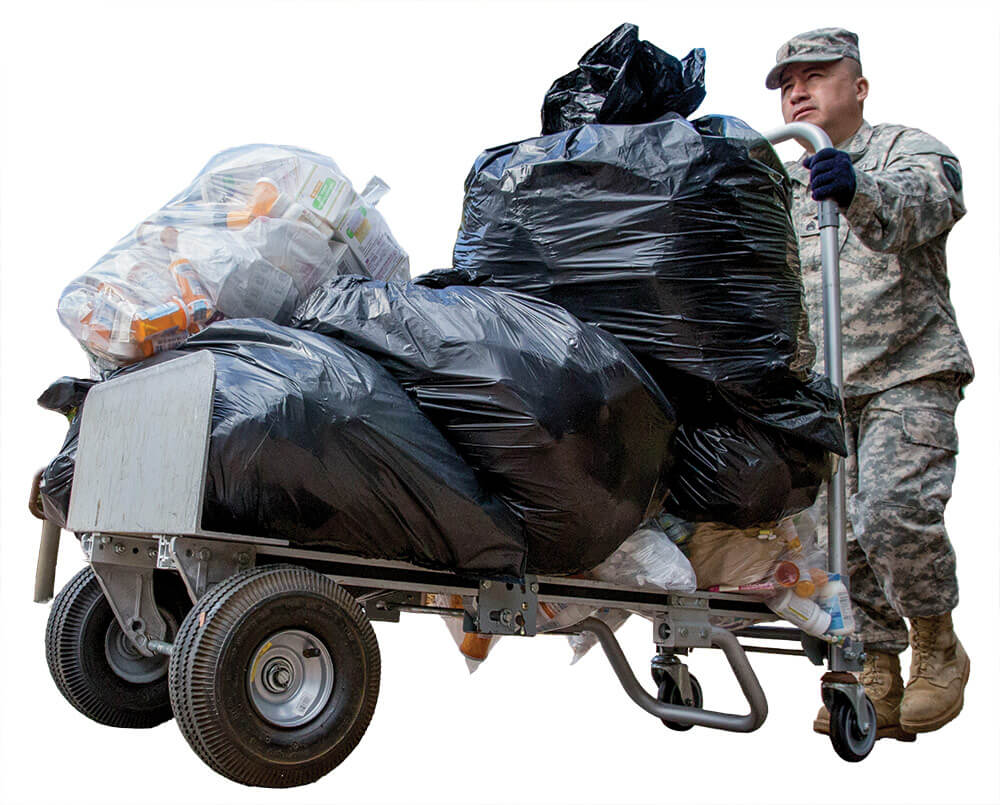
Drug-related deaths have been a problem in this country for generations, but with the use of opioid drugs skyrocketing since the late 1990s, a sense of urgency is growing in the Nation to stop the spread of these highly addictive and deadly drugs.
In September of last year, Francis Collins, director of the National Institutes of Health, spoke with the Washington Post.
“I think this has been an epidemic that has snuck up on us,” he said. “The number of addicted individuals, the number of overdose deaths has just been breathtaking. The medical system was not well prepared for that.”
Data from the Centers for Disease Control and Prevention (CDC) indicate that, in the State of New Jersey, a staggering 2,153 drug-overdose deaths occurred between May of 2016 and May of 2017 – an increase of 31.4 percent compared to the 1,638 deaths the previous year.
The New Jersey National Guard is meeting the opioid epidemic head-on through its partnership with the U.S. Drug Enforcement Agency (DEA) on National Prescription Drug Take Back Day. The DEA-led initiative is a partnership between the National Guard, the DEA, local State and county police departments and concerned residents. Through the program, tons of excess and potentially dangerous prescription drugs are collected and destroyed each year.
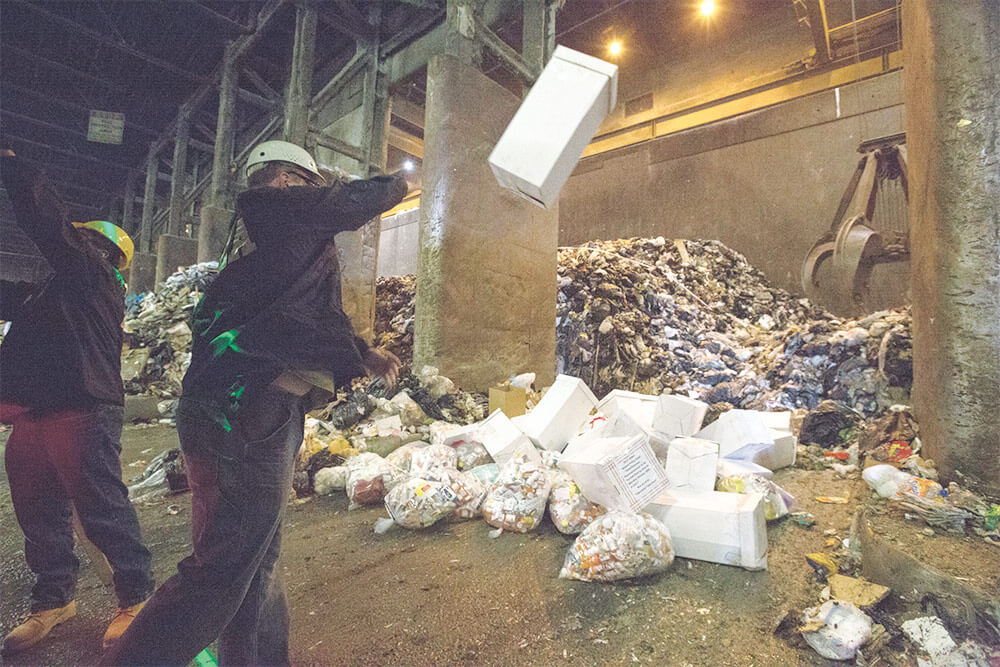
As part of the collaboration, the New Jersey National Guard Counterdrug Task Force is charged with safely destroying the drugs collected by the DEA and local police in the Garden State each year. SFC Jennifer Sbarro liaisons with the DEA for the Counterdrug Task Force.
SFC Sbarro explained that the DEA reached out to the New Jersey Army National Guard to partner on, and potentially organize, a collection process to transport and burn the drugs collected on National Prescription Drug Take Back Day.
“The DEA started [National Prescription Drug Take Back Day] as a means of trying to collect expired over-the-counter pills that were sitting in homes, collecting in medicine cabinets and were accessible to teenagers,” said SFC Sbarro. “These drugs could be abused by the teens or other family members, and potentially lead to a fatal overdose.”
As reported by Army.mil, the initiative began in New Jersey in 2009. It includes collection boxes at 185 locations throughout the State, mainly at police stations. Citizens are encouraged to drop off expired or unneeded prescription drugs at these locations on the bi-annual National Prescription Drug Take Back Day. From there, the drugs are gathered at collection points and picked up by Soldiers of the New Jersey Army National Guard who transport the drugs in tactical vehicles capable of handling heavy loads. The Guard Soldiers then take the drugs to regional disposal sites where they are safely incinerated.
According to DEA Special Agent Timothy McMahon, last April, Operation Take Back New Jersey – as the State-level initiative has been dubbed – took in 15,929 pounds of prescription medication. On a second collection day in October of last year, 14,507 pounds were collected from neighborhood medicine cabinets. That’s a total of well over 30,000 pounds of drugs collected in just one year.
“The home medicine cabinet is the number one way that teenagers are getting their hands on the pills,” McMahon said. “The more residents that can get it out of the house, the better.”
Although the amount varies for each collection event, since 2009, the numbers add up to an impressive total. Working together, the New Jersey National Guard, the DEA, local police departments and responsible residents have removed over 217,000 pounds of dangerous pills from New Jersey homes.
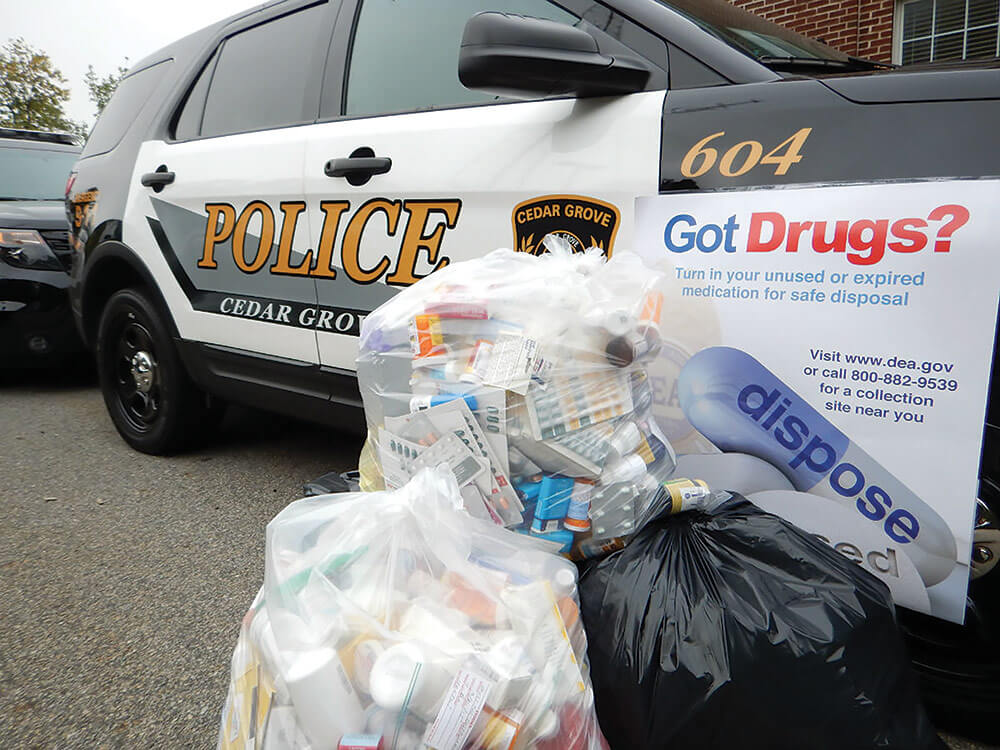
“Because there is such an abuse of [prescription drugs], not just among teens, but among all ages, it has basically become a threat to our entire society,” commented SFC Sbarro. “It’s where the need for programs such as Take Back come about. We’re trying to fight the good fight and [remove] the availability of easily accessed pills.”
The reality is that the New Jersey Counterdrug Task Force is working against staggering statistics concerning the opioid epidemic. According to the CDC, 91 Americans die every day from an opioid overdose; approximately 29 percent of patients who are prescribed opioids for chronic pain, over time begin to misuse them; and 80 percent of heroin users first misused prescription opioids before trying heroin.
In Sussex County, New Jersey, in the far northwest region of the State, the students of Sussex County Community College conducted a survey in late 2017, which revealed 48 percent of county residents knew someone who was addicted to opioids.
On the other side of the State, the federal government has enrolled Ocean County New Jersey into the High Intensity Drug Trafficking Area (HIDTA) program. HIDTA is a program enacted by Congress during the Reagan Administration that aids law enforcement agencies located in areas identified as high drug-trafficking regions. Ocean County is one of the areas in the Nation hardest hit by drugs.
The facts are daunting. But there is a silver lining.
Because of the proven connection between prescription pain killers and subsequent opioid addiction, programs like Operation Take Back New Jersey and National Prescription Drug Take Back Day can make a significant impact in the battle against opioids. Such efforts can promote a high likelihood of success in that efforts to reduce the availability of opioids in homes, hopefully, will prevent some potential first-time users from ever experimenting with the drugs at all.
“It’s just a massive, massive problem,” McMahon said. “Anything that can be done to reduce the supply is huge, not just here in New Jersey, but nationally.”
The New Jersey National Guard has joined this fight for the long haul and is doing its best to help take back the territory – its neighborhoods – lost to the scourge of opioid addiction.
Recognizing that decreasing the availability of prescription pills is just one step in the fight against this epidemic, the New Jersey Guard’s Counterdrug Task Force also works through efforts like demand-reduction initiatives that educate the public on drug abuse prevention.
Air Guard MSgt Chris Wutsch is operations NCO for the task force. According to MSgt Wutsch, while all 54 States and Territories have similar counterdrug programs, the New Jersey Guard tries to make the most of its budget to combat the drug problem on multiple fronts.
“Besides doing Operation Take Back, we also have six personnel that are assigned to the DEA working as analysts,” MSgt Wutsch noted. “We are basically [permanent] help to the DEA.”
The Guard members assigned to the DEA conduct criminal analyst work, researching backgrounds of persons of interest and developing intel packets.
“[The Task Force] is just always readily available,” McMahon said. “It’s been a great relationship that we’ve had. I believe the counterdrug task force is going to continue to flourish.”
Despite the formidable challenge the opioid crisis poses, members of the New Jersey Army National Guard remain hopeful of saving lives and helping put an end to what has become a nationwide crisis. They heard their State’s call for help and have answered.
“The good thing about this [initiative] is that at the end of the day, no matter if we pick up 15 pounds of pills or 15,000 pounds of pills, there is always someone that could have [gotten hooked on those pills] had we not done that mission,” SFC Sbarro said. “There’s always someone that would have had those pills available to them – perhaps a child. At the end of the day, no matter how long it takes, no matter how many hours it takes in planning, you really do feel that you will make a difference. Even if you don’t see it up front, you can make a difference.”
by Staff Writer Matthew Liptak
